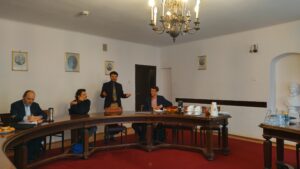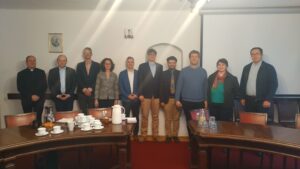report by Miklós Tömöry; pictures by Anca Şincan and Miklós Tömöry
Since the beginning of the project, fellows of the “Negotiating Sovereignty” ERC research group meet twice a year for in-person, work-in-progress seminars. These events provide an opportunity to discuss the current state of their research considering changing church-state relations in general and the practice of oaths of allegiance of Catholic bishops and archbishops in the Habsburg Empire and their successor states.
On April 24, 2024 the research group held their fourth in-person session in Warsaw, at the Tadeusz Manteuffel Institute of History (Polish Academy of Sciences). This time, colleagues dealing with topic from the 20th century perspective, presented their findings at a seminar open for the public. Dr Tomáš Pavliček, Prof. Paweł Skibiński, and Fr dr Albert Warso took part at the event as invited discussants.

In his presentation, András Fejérdy analyzed deteriorating church-state relations during the Hungarian People’s Republic (1918-1919) and showed the circumstances under which the question of loyalty (and the need for an oath) of the Catholic higher and lower clergy to the state and “the people” was raised.
Željko Oset analyzed the attitude of the Catholic bishops and archbishops to the new Yugoslav regimes established after the First and Second World War respectively. In his contribution, Dr. Oset concentrated on the Yugoslav bishops’ conference sessions in November 1918 and September 1945 and the role of the two leading personalities; Anton Bonaventura Jeglič (bishop of Ljubljana in 1918) and Alojzije Stepinac (archbishop of Zagreb in 1945).
Anca Şincan presented the 1948 oath-taking act of the Greek and Roman Catholic high clerus in Romania in the light of the so far unknown sources from the Vatican archives. The oath of allegiance to the state was presented as a tool of “normalization” by the contemporary propaganda. However, it can be seen rather as an act of humiliation with the goal to undermine solidarity between Roman and Greek Catholic bishops only a few months before Eastern Catholicism was made illegal in Communist Romania.
Przemysław Pazik presented the process of negotiations around the oath of allegiance in the 1925 Polish Concordate, as well as its long aftermath after Piłsudski’s 1926 coup d’état. The post-1945 Polish People’s Republic viewed the clergy as potentially untrustworthy citizens, who were however expected to convey the political, economic and social messages of the Communist state to the faithful.

We would like to thank for the organisation and the hospitality, to the Tadeusz Manteuffel Institute of History and to our Polish colleagues, Tomasz Hen-Konarski and Przemysław Pazik.
Follow the activities of the ERC Sovereignty project on our website and our Facebook page.
